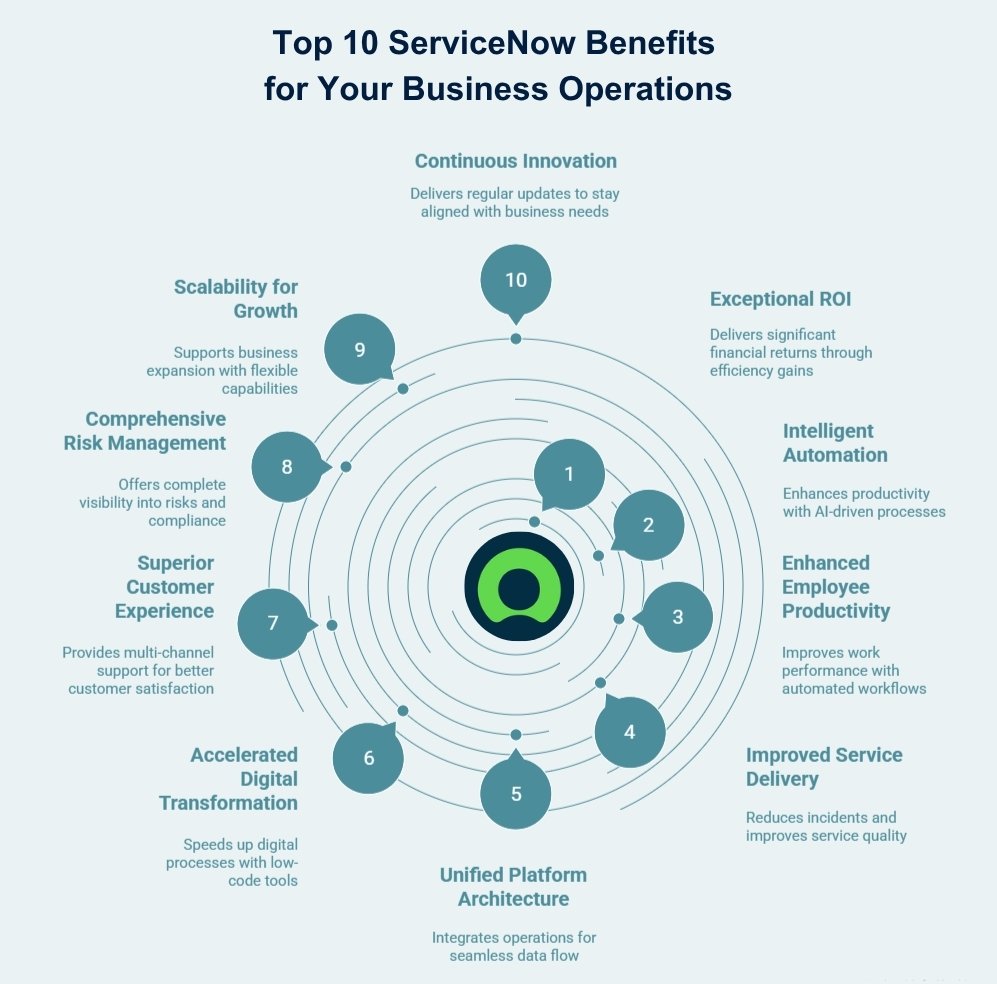Benefits of ServiceNow for Your Business Operations
Elevate your ServiceNow workflows with DevTools—streamline operations, boost reliability, and gain clarity. Connect with our team today to explore tailored optimization for your environments.
14 +
Years of Experience
550 +
Happy Customers
250 +
Years of Tech Leadership Exp.

"License Reseller" and "Consulting & Implementation" Partner

TL;DR
- ServiceNow centralizes IT, HR, customer service, and security operations on a unified platform to eliminate silos and streamline workflows.
- Automation, AI features, and low-code tools accelerate digital transformation, reduce manual work, and boost employee productivity.
- Organizations achieve strong ROI through faster issue resolution, reduced operational costs, and higher service quality.
- Scalability, continuous innovation, and industry-specific solutions make ServiceNow suitable for high-growth and highly regulated sectors.
ServiceNow serves as the preferred platform for businesses that want to achieve operational transformations, boost productivity, and deliver superior customer experiences. ServiceNow stands out as a powerful business transformation tool because of its specific advantages, which this guide explains through actual business results and industry expert insights, and ROI data.
What is ServiceNow?
ServiceNow operates as a cloud-based enterprise platform that enables organizations to handle digital workflow management across their IT operations and customer service departments and HR functions and security operations, and business applications. ServiceNow functions as a single system of action, enabling people, processes, and systems to connect through intelligent, automated workflows.
The platform operates as a single platform, which enables data to move between departments while AI tools work with human operators to optimize all business processes for maximum efficiency. The Now Platform architecture of ServiceNow provides organizations with a unified platform that enables them to handle IT incidents, employee onboarding and enterprise risk management from a single platform.
Key ServiceNow capabilities include:
- IT Service Management (ITSM): Comprehensive IT service delivery and support with automated ticketing, change management, and asset lifecycle management
- IT Operations Management (ITOM): Proactive infrastructure monitoring, AIOps-driven insights, and service mapping
- Customer Service Management: Omnichannel customer support with AI-powered case resolution
- HR Service Delivery: Employee lifecycle management from onboarding through offboarding
- Integrated Risk Management: Enterprise-wide governance, risk, and compliance
Why Modern Businesses Need ServiceNow
Modern business operations face multiple challenges that traditional systems fail to handle effectively.
Organizations maintain more than 100 applications spread across their cloud and on-premises infrastructure. The process of handling complex systems through manual methods produces both inefficient operations and incorrect results.
The workplace requires employees to experience the same easy-to-use systems they find in their personal lives. The use of complicated internal systems creates employee dissatisfaction, which results in decreased productivity.
ServiceNow unites all departmental data into a single platform, which removes information silos.
Business organizations require platforms that support fast change implementation because their operations need to adapt quickly to market demands.
Top 10 ServiceNow Benefits for Your Business Operations

1. Exceptional Return on Investment (ROI)
ServiceNow ITSM implementation with Forrester research produced 195% ROI and $17.3 million present value benefits during three years of operation. Strategic Portfolio Management users achieved the highest ROI at 365% during their three-year implementation period.
ServiceNow generates financial benefits through various channels, which include reduced human work and tool consolidation and shorter repair times and better first-contact resolution, and shorter outage durations. ServiceNow programs that execute well will generate their initial investment return between six months and two years, based on project extent.
2. Intelligent Automation and AI Integration
ServiceNow stands at the forefront of AI deployment in practical applications. The Now Assist AI features, together with autonomous AI agents, help organizations achieve quantifiable productivity enhancements throughout their operations. The AI Control Tower of ServiceNow experienced a 4 times increase in traffic volume during Q3 2025 because organizations accelerated their AI deployment.
The system produces actual results, which include Accenture’s 10% faster mean time to repair and 50% faster root cause analysis through automated incident summarization and predictive analytics that detect service bottlenecks before they affect users. The Workflow Data Fabric of ServiceNow enables AI to process real-time data from live operations, which results in accurate and relevant outcomes.
3. Enhanced Employee Productivity
ServiceNow enables better employee work performance through its automated workflow management system and self-service functionality. The implementation of ServiceNow ITSM by Forrester Research leads to a 20% boost in IT operational productivity. The system provides three main features that let employees fix problems independently through automated request handling and smart search functions, and chat-based support.
The system enables employees to find solutions independently through its automated request handling system and smart search function, and chat-based support system. The Employee Service Center provides a single portal that combines HR and IT and facilities, and legal request processing to eliminate the requirement for multiple system access for standard operations. The mobile application enables staff members to initiate requests and monitor progress from any location, which decreases both work interruptions and employee dissatisfaction.
4. Improved Service Delivery and Quality
ServiceNow implementation by organizations leads to a 25% decrease in P1 incidents, which represent the highest severity level. The platform delivers exceptional results through Service Mapping, which shows service dependencies and proactive monitoring that detects problems before they become major issues and standardized processes that maintain consistent quality, and complete knowledge management that speeds up problem resolution.
Healthcare organizations using ServiceNow achieve 50% faster root-cause analysis, while banks using ServiceNow Event Management reduce false-positive alerts by 45% during their first six months of implementation. The service availability and user satisfaction improve directly because of these enhancements.
5. Unified Platform Architecture
ServiceNow provides organizations with their most valuable advantage through platform unification. Organizations can merge their IT service management and HR operations and customer service, and security operations into one platform that shares data and provides unified user experiences and automated workflows.
The platform design enables data to move automatically between departments, which removes the need for manual data reconciliation. The Workflow Data Fabric reduces integration expenses by 70% while users learn to operate from a single interface instead of multiple systems, and IT teams handle a single platform instead of multiple point solutions.
6. Accelerated Digital Transformation
ServiceNow accelerates digital transformation processes at a rapid pace. The App Engine of ServiceNow allows business users to create applications through low-code/no-code development without needing programming expertise. ServiceNow stands as the leading Enterprise Low-Code Application Platform according to Gartner’s Magic Quadrant Leader evaluation.
ServiceNow enables organizations to automate their manual operations through a platform that delivers results within a few weeks instead of taking months to complete. The platform features an extensive integration hub, which enables users to automate workflows between different enterprise systems, including both legacy and modern applications. The platform delivers immediate value to businesses because it operates at high speed.
7. Superior Customer Experience
The Customer Service Management solution on ServiceNow provides support through multiple channels, which include web platforms and mobile devices and chat functions and social media platforms, and voice communication. The system uses artificial intelligence to handle basic customer support tasks so human representatives can handle complicated situations that need emotional understanding and decision-making skills.
The platform enables complete customer history access through its case management system, which allows for individualized service delivery. The platform enables seamless on-site support delivery through Field Service Management, which works in tandem with contact center operations. Organizations achieve substantial improvements in customer satisfaction ratings and first-point-of-contact solution rates.
8. Comprehensive Risk Management and Compliance
ServiceNow Integrated Risk Management provides organizations with complete visibility into operational and financial and IT and compliance risks throughout their entire system. Organizations achieve better regulatory management through automated policy administration and continuous monitoring systems, and real-time risk monitoring dashboards.
The platform integrates Security Operations to create a complete risk management system, which transforms system vulnerabilities into risk records and security events into control mappings and audit findings into remediation workflows. The platform achieves a 30% boost in operational efficiency according to industry performance metrics.
9. Scalability for Growth
ServiceNow provides organizations with flexible growth capabilities that support their transition from departmental to enterprise and multinational corporation levels. The cloud-based architecture of ServiceNow enables organizations to expand their user base and module selection through simple licensing processes.
The platform extends its scalability features beyond basic user management. The configuration management database of ServiceNow handles millions of configuration items and Performance Analytics processes billions of records and the platform supports worldwide deployments with built-in support for multiple languages and currencies. ServiceNow expands its capabilities to match your business expansion.
10. Continuous Innovation and Investment
ServiceNow delivers two major platform updates every year through its continuous innovation approach, which avoids disruptive system updates. The platform updates at regular intervals to maintain alignment with business requirements and technological advancements.
ServiceNow has established a $1 billion AI revenue goal for 2026 to prove its dedication to AI-based business transformation. The platform has introduced several new features, including advanced AI agent functionality and RPA integration for automation and Platform Analytics for enhanced analytics, and expanded industry solutions for telecommunications and financial services and healthcare, and manufacturing.
ServiceNow delivers its most significant advantages to specific business sectors, which include Financial Services and Healthcare and Manufacturing, and Telecommunications.
Read:- Everything You Need to Know About ServiceNow Integration
Industries That Benefit the Most from ServiceNow
- Financial institutions and insurance organizations use ServiceNow to achieve regulatory compliance and operational stability and deliver enhanced customer service experiences. The platform delivers essential risk monitoring capabilities together with automated compliance reporting functions, which are essential for operations.
- Healthcare organizations use ServiceNow to unite clinical operations with IT management while handling medical device maintenance and HIPAA compliance requirements. The platform enables electronic health record integration with IT service management through its connection capabilities.
- Manufacturing companies use ServiceNow to achieve OT/IT convergence by linking their factory systems to corporate IT infrastructure. The platform enables predictive maintenance scheduling and supply chain visibility, and quality management systems to achieve operational excellence.
- Through ServiceNow, telecommunications companies manage their networks, provide service assurance, and handle customer operations. The Telecommunications Service Management module contains specific functionality for this industry sector.
Partner with DevTools for ServiceNow Implementation
DevTools helps organizations maximize ServiceNow benefits across the financial services, healthcare, automotive, and manufacturing sectors. Our team of ServiceNow-certified experts delivers complete platform implementation and integration, and optimization services.
Our comprehensive ServiceNow services include:
- Strategic Assessment and Roadmap Development: We evaluate your current state and design a phased ServiceNow implementation aligned with business priorities
- Platform Implementation: Our experts deploy ITSM, ITOM, HRSD, CSM, IRM, and custom applications following ServiceNow best practices
- Integration Services: We connect ServiceNow with your existing enterprise systems, ensuring seamless data flow and process automation
- AI and Automation Enablement: We implement Now Assist capabilities and autonomous AI agents to drive productivity gains
- CSDM Implementation: We structure your CMDB according to ServiceNow’s Common Service Data Model for maximum platform value
- Performance Analytics Deployment: We configure KPIs, dashboards, and predictive analytics to enable data-driven decisions
- Change Management and Training: We ensure successful adoption through comprehensive user enablement and organizational change management
- Managed Services: Our team provides ongoing platform optimization, release management, and continuous improvement
With DevTools as your ServiceNow partner, you gain more than technical implementation; you gain strategic advisors committed to delivering measurable business value.
Conclusion
ServiceNow represents more than workflow automation; it’s a comprehensive platform that transforms how organizations operate in the digital age. The platform provides significant business value through its outstanding return on investment (ROI), AI-driven automation, improved service delivery, and integrated operational capabilities.
ServiceNow enables businesses to establish sustainable market leadership through its platform, which handles complex operations and rapid change, and elevates customer requirements. Organizations that adopt ServiceNow create themselves for success in an AI-based business environment where operational excellence determines market dominance.
ServiceNow investment decisions should focus on the speed at which you can apply its features to enhance operational performance and customer value delivery.
FAQs
What are the main benefits of using ServiceNow?
The platform delivers 195% ROI during three years and 20% productivity growth 25% fewer P1 incidents and unified platform architecture and AI-based automation and fast digital transformation and superior customer service and complete risk management and effortless scalability, and ongoing platform development.
How does ServiceNow improve business efficiency?
ServiceNow enables businesses to achieve better efficiency through its combination of automated processes and streamlined operations and self-service platforms and AI-based analytics and unified information systems, and automated workflow connections between IT and HR and customer service, and business operations.
What types of businesses benefit most from ServiceNow?
ServiceNow delivers its most significant advantages to organizations that operate in Financial Services and Healthcare and Manufacturing and Telecommunications and Government, and Technology sectors.
How does ServiceNow help in digital transformation?
ServiceNow enables digital transformation through its platform by offering low-code development tools and extensive integration features and AI automation and mobile-friendly interfaces and fast deployment times that let businesses transform their operations within weeks instead of months.
How does ServiceNow help in digital transformation?
ServiceNow enables organizations to achieve digital transformation through its platform, which offers low-code development tools and extensive integration features and AI automation and mobile-friendly interfaces, and fast deployment times.
What are the ROI benefits of implementing ServiceNow?
Organizations achieve 195-365% ROI over three years through reduced operational costs, improved productivity, decreased tool sprawl, faster resolution times, reduced outage hours, and enhanced service quality. The implementation scope determines the payback period, which ranges from 6 months to 24 months.
Is ServiceNow suitable for small and medium enterprises (SMEs)?
ServiceNow provides packages for expanding businesses, which include flexible pricing options and adaptable deployment methods. ServiceNow provides enterprise-level functionality to small and medium enterprises, but the largest benefits emerge when organizations have more than 500 employees.

Pramodh Kumar M is a Solutions Architect at DevTools with over 6 years of specialized experience in DevSecOps and enterprise IT solutions. He holds multiple advanced certifications, including Certified Kubernetes Security Specialist (CKS), GitHub Advanced Security, and Azure Solutions Architect Expert. Pramodh specializes in Agile, Cloud & DevOps toolchain implementations, with extensive hands-on experience helping enterprises with digital transformation initiatives. His expertise extends to ServiceNow implementation and support. He is passionate about sharing practical insights on Cloud, DevOps, Automation, and modern IT operations.




